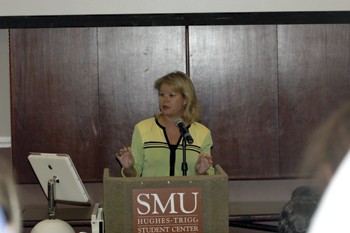
The Dallas Morning News’ Keven Ann Willey was the guest speaker at the President’s Leadership Summit. (Sarah Acosta)
Editorial Page Editor for The Dallas Morning News Keven Ann Willey shared her experiences as an editor on Wednesday at the President’s Leadership Summit sponsored by the Office of SMU President R. Gerald Turner. Willey spoke about what fundamentals she believes are key to running an editorial board of a newspaper.
Willey, who is also the vice president for The Dallas Morning News, spoke about her role as a leader in the Hughes-Trigg Forum at 5 p.m.
Editorial pages and opinion pieces of newspapers are what Willey believes to be the key leadership tools for society. In order to provide an adequate editorial page for readers, Willey said the following five criteria must be met: community leadership, a forum for timely and informed debate, diversity of faces and viewpoints on pages, actively engaging readers and increasing readership.
However, when writing for a paper that has an editorial op-ed page published seven days a week, Willey said one of the most difficult aspects for most of her staff is to keep interest in stories that have been written about several times.
“The challenge for writing in an editorial board is to write about the same topic over and over again without sounding shrill or trite,” Willey said. “We feel it’s important that we use the best brain cells to set the agenda for society.”
For years Willey said the newspaper was the only way for people to go to get news and information, but now with the Internet and decline of print news it is critical for journalists to engage readers for publications to survive.
“Sometimes I feel like we’re flying blindly in that we don’t know what the future newspapers will look like,” Willey said. “We just don’t know what technology holds for the future.”
But one thing Willey said she is not concerned with is the need for editorials in a society that is overwhelmed with information.
“I am absolutely convinced there will always be a role for editorials,” Willey said. “I don’t need to provide you with more information when you’re surrounded by it constantly, but I can help you with sifting through what is important.”
First-year Nikki McDaniel, a management major, said she agreed that editorial pieces are helpful, even to people like herself who don’t like to read the newspaper but do want to know about current issues.
“I’ve never been a big reader of the paper except for the comics,” McDaniel said. “But I know a lot of the issues I’m interested in are so hard to understand when you’re reading them from all these different places. With editorials, it’s clear what the issues are and I can read them and understand what’s going on.”
President Turner also advised future journalism students to learn from Willey’s career and reminded them to be flexible in their career path.
“Be open to what changes and possibilities may occur,” Turner said. “You just never know what will happen within the industry and your career.”
Part of being a leader means keeping anxieties to yourself so your staff doesn’t get stressed as well, Willey said.
“It’s taking a deep breath,” Willey said. “You have to be sure that you really enjoy what you’re doing or else it’s all false.”
To make sure that she and her staff remain optimistic, even in times when half her staff has been downsized, Willey said she focuses on what she can control.
“I can’t control the industry or the stock market,” Willey said. “What I can control is helping them put out their best editorial column or whatever it is they’re working on. Let’s focus on what we can control and let’s do that damn well.”








